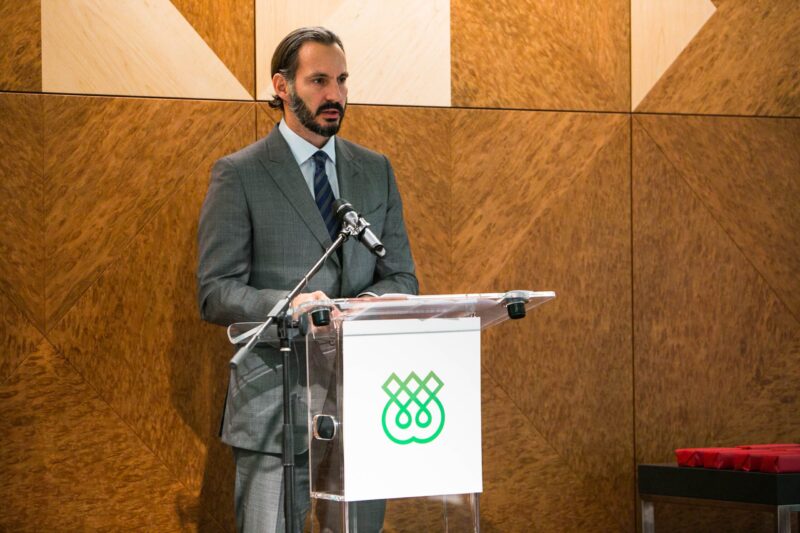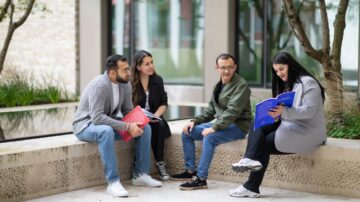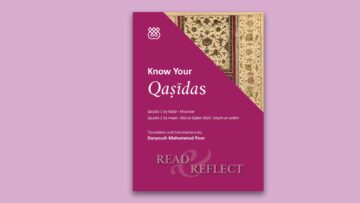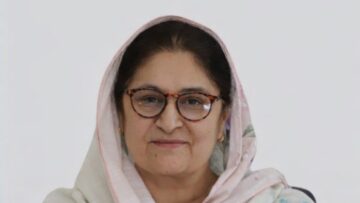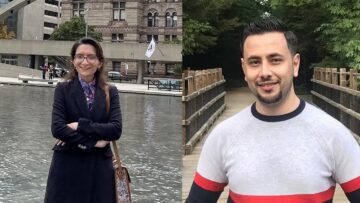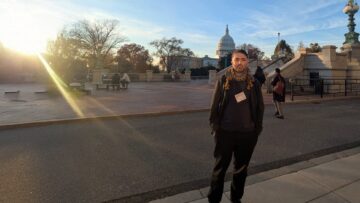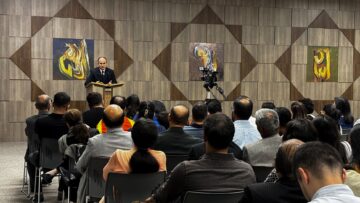On 25 November 1977, His Highness the Aga Khan officially inaugurated The Institute of Ismaili Studies. To mark this momentous anniversary, the Board of Governors hosted a celebration for staff, visiting faculty and students on Friday 24 November, with Prince Rahim Aga Khan in attendance. The event celebrated the role of the people who have contributed to developing an academic centre for Ismaili studies, that has had a significant impact on the field of Shi‘i and Ismaili studies in the last 40 years.
During the celebration, Prince Rahim thanked members of staff, for their contributions to the work of the Institute, and their commitment to His Highness’ vision. He remarked that this was a momentous day, where we should reflect on the Institute’s progress and achievements, and celebrate the people who have made this possible. He further commented on how the students are the life blood of the Institute and our future leaders. Reflecting on the formation of IIS, Prince Rahim considered how it was prescient and timely. He said that we have been dealing with the globalisation of the Jamat and its patterns of migration, which has made it even more important to be able to provide the Jamat with authentic, and well-prepared materials to enable an understanding of its history and heritage, and of matters of faith and practice. Prince Rahim noted that IIS is a unique institution which has been breaking new ground and has created something which doesn’t exist elsewhere.
Prince Rahim also congratulated and recognised long-serving members of staff, who have been employed by the Institute for 20 years or more – including Mr Shams Vellani, who has been with the Institute since it was founded.
Other staff members who have been with the Institute for over 20 years, and were recognised included: Dr Jalal Badakhchani – 38 years; Rita Bishop – 20 years; Dr Farhad Daftary – 29 years; Dr Aziz Esmail – 29 years; Joy Johnson – 27 years; Kutub Kassam – 34 years; Khadija Lalani – 28 years; Hadi Mirshahi – 24 years; Alnoor Nathani – 23 years; Shamim Salaam – 22 years; Anna Spinola – 33 years and Dr Shiraz Thobani – 34 years.
Since its establishment in 1977 – with six members of staff – the IIS has seen significant growth and now employs over 115 people.
The library was one of the first endeavours of the IIS, and has established itself as a central repository and resource for Ismaili and Islamic Studies. Over time, the collection has grown to hold 42,000 volumes and has been entrusted with the collections of eminent Islamic Studies scholars, such as Professors Mohammed Arkoun and Anne-Marie Schimmel, Dr Zahid Ali and Muhammad Ali Hamdani. More recently Dr Daftary, has generously pledged his entire personal collection ofover 5000 books, to the library.
The IIS published its first book, Henri Corbin’s Cyclical Time and Ismaili Gnosis, in 1983. To date, the Institute has produced 138 publications and translated many titles into French, Arabic, Persian, Portuguese and Russian. It has also developed and published a series of religious education curriculum for the Ismaili community – for pre-school to secondary school aged children. The IIS secondary curriculum modules have been published in 10 languages and are currently being used in 25 countries.
Preservation and study of Ismaili heritage has been integral to the work of the IIS since the beginning. In its care is one of the most significant repositories of materials related to Ismaili communities in the world. Over 3,000 manuscripts are held in the Ismaili special collections, including one of the oldest Ismaili manuscripts in the world from the 14th century.
Another aspect of the mandate of the organisation is the development of people. Since 2001, over 3,000 people have participated in professional development and education programmes led by the IIS, such as Leadership Orientation Programmes for the JamatAssembly or religious congregation; also a term used by the Nizari Ismailis for their individual communities., Waezeen Training and the Summer Programme on Islam. In addition, over 550 people have graduated from programmes offered by the IIS, including 240 students from the Secondary Teacher Education Programme and 223 from Graduate Programme in Islamic Studies and Humanities. The Institute has awarded 45 doctoral scholarships since 1997.
Achieving success is always a challenging endeavour. For IIS, building on that success, into the next decades may be as demanding as it has been for the first four decades of its life. However, this is now the task ahead for everyone who is engaged with the future of the Institute.

